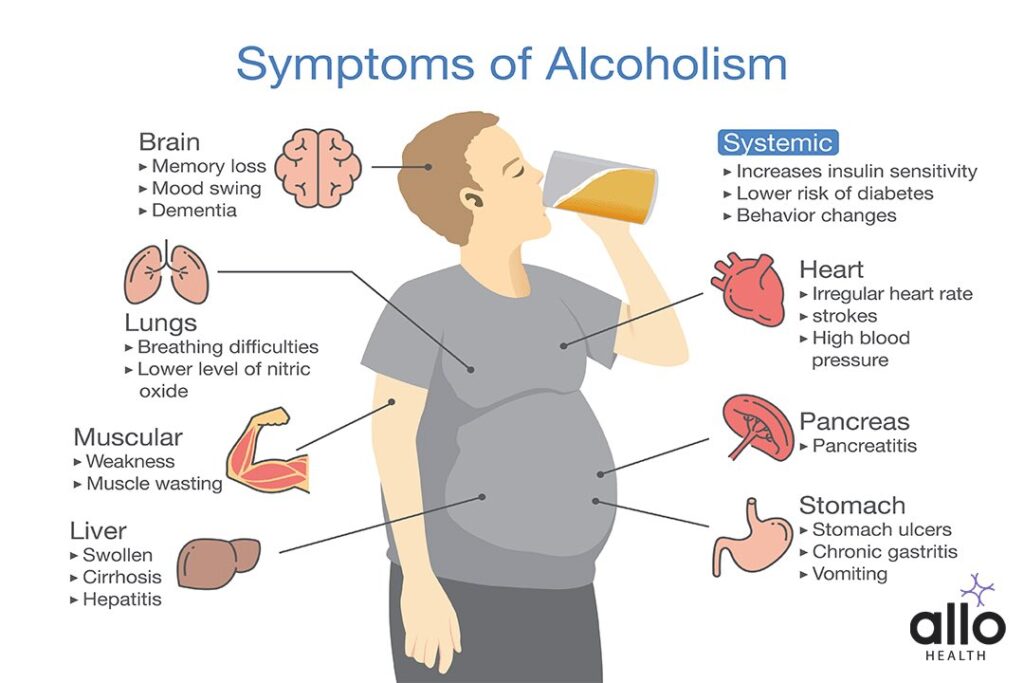Alcohol Addiction And Sexual Dysfunction

Allo Health is dedicated to personalized well-being, offering support and trusted information tailored to individual health goals. The platform emphasizes human-generated content, led by a distinguished medical team of experts, including physicians and sexual health specialists. Their commitment to credibility involves rigorous fact-checking, authoritative research, and continuous updates to ensure accurate, up-to-date information. Allo Health's unique approach goes beyond conventional platforms, providing expert-led insights and a continuous commitment to excellence, with user feedback playing a crucial role in shaping the platform's authoritative voice.

An early career psychiatrist with extensive experience in general adult psychiatry, relationship issues, psychosexual problems & special interest in sexual medicine, disorders with addictive behaviours and Obsessive Compulsive disorders. He is an astute physician with excellent academic record and research experience. He is also a member of World Health Organisation and World Psychiatric Association. His vision and goal for Allo is an inclusive, accessible digital health clinic for psychosexual difficulties.
Why This Was Upated?
Our experts continually monitor the health and wellness space, and we update our articles when new information became available.
Updated on 16 April, 2024
- Article was updated as part of our commitment to diversity, equity, and inclusion.

"The following blog article provides general information and insights on various topics. However, it is important to note that the information presented is not intended as professional advice in any specific field or area. The content of this blog is for general educational and informational purposes only.
Book consultation
The content should not be interpreted as endorsement, recommendation, or guarantee of any product, service, or information mentioned. Readers are solely responsible for the decisions and actions they take based on the information provided in this blog. It is essential to exercise individual judgment, critical thinking, and personal responsibility when applying or implementing any information or suggestions discussed in the blog."
What is Alcohol addiction?
Alcoholism, is a chronic disease characterized by a strong craving for alcohol and the inability to control one’s drinking. It is a progressive condition that can have severe negative effects on a person’s physical, psychological, and social well-being.
Alcoholism can develop gradually over time, and it is often difficult for someone with the condition to recognize that they have a concern. Some common signs include:
- Drinking more or for longer periods than intended
- Difficulty controlling or cutting back on drinking
- Spending a lot of time drinking or recovering from the effects
- Giving up important activities or hobbies in favor of drinking
- Continuing to drink despite negative consequences, such as concerns at work or in relationships
Some people may have a genetic predisposition to addiction, while others may turn to alcoholism, as a way to cope with stress or other concerns in their lives.
Treatment for the addiction typically involves a combination of therapy, medication, and support groups. Therapy can help individuals understand the underlying causes of their addiction and develop strategies for coping with cravings and triggers. Medications such as naltrexone and acamprosate can help reduce cravings and make it easier for people to stick to their treatment plan. Support groups such as Alcoholics Anonymous can also be a valuable resource for people in recovery, providing a sense of community and accountability.
With the right treatment and support, individuals can learn to manage their addiction and regain control of their lives.
How Is Alcohol Addiction Diagnosed?
The first step in diagnosing alcohol addiction is a medical evaluation. A healthcare provider will typically conduct a physical examination, take a medical history, and ask about any symptoms or concerns related to alcohol use. They may also order blood tests or other laboratory tests to check for signs of liver damage or other health concerns related to alcohol.
In addition to a medical evaluation, a psychological evaluation is also an important part of diagnosing the addiction. A mental health professional will typically conduct an interview or administer a questionnaire to assess the individual’s drinking habits, emotional state, and overall mental health. They may also use standardized tools such as the Alcohol Use Disorders Identification Test (AUDIT) or the Diagnostic and Statistical Manual of Mental Disorders 5TR (DSM-5TR) to determine if the individual meets the criteria for alcohol addiction.
Another way to diagnose the addiction is through the use of self-assessment tools, these tools can be found on various websites or mobile apps and can help you determine if you have an alcohol addiction.
If the addiction is diagnosed, the next step is to develop a treatment plan. This may include a combination of therapy, medication, and support groups. Inpatient or outpatient rehabilitation programs may also be recommended, depending on the severity of the addiction.
How Does Alcohol Affect The Body?

Alcohol is a legal, but highly addictive substance that affects the body in many ways. Consuming it can lead to short-term and long-term health concerns, and excessive drinking can lead to addiction and even death. Understanding the ways in which it affects the body can help you make informed decisions about your drinking habits.
Short-term effects on the body include impaired judgment, coordination, and reflexes. This can lead to accidents, injuries, and risky behaviors. Consuming large amounts of it can also lead to nausea, vomiting, and even blackouts.
Long-term effects on the body include liver damage, cancer, heart disease, and brain damage. It can also lead to addiction, which can have a negative impact on a person’s relationships, career, and overall quality of life.
Alcohol affects the brain by slowing down the central nervous system. This can lead to difficulty with motor coordination, slurred speech, and impaired judgment. Long-term abuse can lead to brain damage, including memory loss and a decrease in cognitive function.
Can Alcohol Addiction Cause Sexual Dysfunction?
One of the lesser-known effects of alcohol addiction is sexual dysfunction.?When consumed in moderate amounts, it can have a relaxing effect on the body and may even enhance sexual desire. However, when consumed in excessive amounts, it can have the opposite effect and can lead to sexual dysfunction. This is because alcohol is a central nervous system depressant, which means that it slows down the body’s systems and can impair sexual function.
Alcohol Induced Sexual Dysfunctions
Erectile Dysfunction
Alcohol affects the blood vessels, which can make it difficult for men to achieve and maintain an erection. Additionally, alcohol can also affect the levels of testosterone in the body, which is the hormone responsible for sexual desire in men.
Low Libido
The overconsumption of alcohol over a long period of time can lead to decrease in libido, which is the sexual desire in women. Additionally, alcohol addiction can also lead to vaginal dryness, which can make sexual intercourse uncomfortable.
Psychological Conditions
A dependence on alcohol can also lead to sexual dysfunction by causing psychological concerns such as depression, anxiety, and stress. These psychological concerns can affect an individual’s sexual function by making it difficult for them to relax and focus during sexual activity.
Sexual dysfunction caused by alcohol addiction is reversible, and the best way to address it is to seek help. This can include therapy, support groups, and medication-assisted treatment. Additionally, reducing the amount of alcohol consumed and avoiding it altogether can help to improve sexual function.
Mental Health Disorders
These disorders can range from mild to severe and can have a significant impact on an individual’s quality of life.
Depression
Alcohol is a depressant, and long-term use can lead to feelings of sadness, hopelessness, and worthlessness. Alcoholics are also at a higher risk of suicide than non-alcoholics.
Anxiety
Another mental health disorder caused by alcohol addiction is anxiety. Alcohol can cause feelings of nervousness, fear, and panic. It can also worsen existing anxiety disorders.
Psychosis
Alcohol addiction can also lead to psychosis, a severe mental disorder characterized by hallucinations, delusions, and disordered thinking. Those that are addicted are also at a higher risk of developing schizophrenia, a chronic and severe mental disorder that affects how a person thinks, feels, and behaves.
Cognitive Impairment
Alcohol addiction can also lead to memory concerns and cognitive impairment. Long-term abuse can damage the brain and lead to concerns with memory, attention, and decision-making. It can also increase the onset of normal age related cognitive decline. This can make it difficult for alcoholics to hold down a job or maintain relationships.
Major Organs Negatively Affected

Alcohol addiction can have a detrimental effect on a person’s physical and mental health, and it can also take a toll on a number of major organs in the body.
Brain
Alcohol can cause damage to the brain’s neurons, which can lead to memory loss, difficulty concentrating, and an increased risk of developing dementia. Additionally, it can affect the balance of chemicals in the brain, leading to depression and anxiety.
Liver
Alcohol is metabolized in the liver, and over time, excessive drinking can lead to liver damage, including cirrhosis and liver cancer. The liver is responsible for removing toxins from the body, and when it is damaged by alcohol, it is not able to function properly, leading to a build-up of toxins in the body.
Pancreas
The pancreas produces insulin, which regulates blood sugar levels, and alcohol can interfere with this process, leading to an increased risk of developing diabetes (high blood glucose levels). Additionally, it can cause inflammation of the pancreas, leading to pancreatitis, which can be a life-threatening condition.
Heart
Alcohol can increase the risk of high blood pressure, which can lead to heart disease and stroke. It can also cause damage to the heart muscle, leading to heart failure.
Chronic alcohol abuse can have a significant impact on a person’s physical and mental health, and it can also take a toll on a number of major organs in the body, including the brain, liver, pancreas, and heart.
Behavioural Consequences
Tolerance Development
As an individual continues to drink, their body becomes accustomed to the presence of alcohol, and they need to consume more and more to achieve the same level of intoxication. This can lead to an increased risk of alcohol poisoning and other health complications.
Loss Of Control
Individuals with alcoholism may find themselves unable to stop drinking once they start, even if they want to. They may also continue to drink despite the negative consequences it is causing in their life.
Social Behaviour Changes
Individuals with alcoholism may withdraw from friends and family, and may become isolated and alone. They may also engage in risky behaviors, such as driving under the influence or having unprotected sex, which can put themselves and others at risk.
Psychological Wellbeing Changes
Alcohol addiction can also have a significant impact on an individual’s emotional and psychological well-being. Individuals with alcoholism may experience depression, anxiety, and other mental health concerns. They may also have difficulty managing stress and may turn to alcohol as a means of coping.
High-Risk Physical Or Sexual Behaviors
- Alcohol impairs a person’s ability to drive safely, increasing the risk of car accidents and other incidents on the road. This not only puts the individual at risk, but also puts other people in danger.
- Alcohol can impair judgment and lead to risky decisions regarding sexual partners and protection. This can lead to unwanted pregnancies and the transmission of sexually transmitted infections.
- Individuals who are addicted spend large amounts of money on alcohol, leading to financial difficulties. They may also engage in criminal behavior while under the influence, such as theft or violence.
- Individuals who are addicted may neglect their responsibilities and relationships, leading to a breakdown of communication and trust.
How Prevalent Is Alcohol Addiction In India?
According to a study by the World Health Organization, alcohol consumption in India has increased by 55% over the past decade. This increase in consumption has led to a rise in the number of individuals struggling with the addiction in the country.
One of the main reasons for the high prevalence of the addiction in India is the cultural acceptance of drinking. In many parts of India, alcohol consumption is seen as a social norm and is often associated with celebrations and special occasions. This cultural acceptance of alcohol can make it difficult for individuals to recognize when their drinking habits have become concerning.
Additionally, the availability of cheap alcohol in India has also contributed to the high prevalence of the addiction. Many individuals, particularly those from lower socio-economic backgrounds, are able to purchase it at very low prices, making it easy for them to develop high severity of a dependence.
The consequences of the addiction in India are severe and far-reaching. It can lead to a variety of physical and mental health concerns, including liver disease, heart disease, and depression. It can also lead to financial concerns and relationship difficulties.
It is important to raise awareness about the dangers of excessive alcohol consumption and to provide support and resources for individuals struggling with addiction. This can include education and awareness campaigns, as well as access to treatment and rehabilitation services.
Sexual health associated with alcohol abuse is common, but can be treated with the support of the right professionals. Often, people don’t priorities their sex life, or even consider sexual health as part of their health checks – it’s important, we’re here for you.
Sexual health is as important as physical and mental health. In most cases, one consultation can go a long way. Personalised, discreet, and judgement-free treatment at your fingertips – book an online consultation with one of Allo?s leading experts.







































